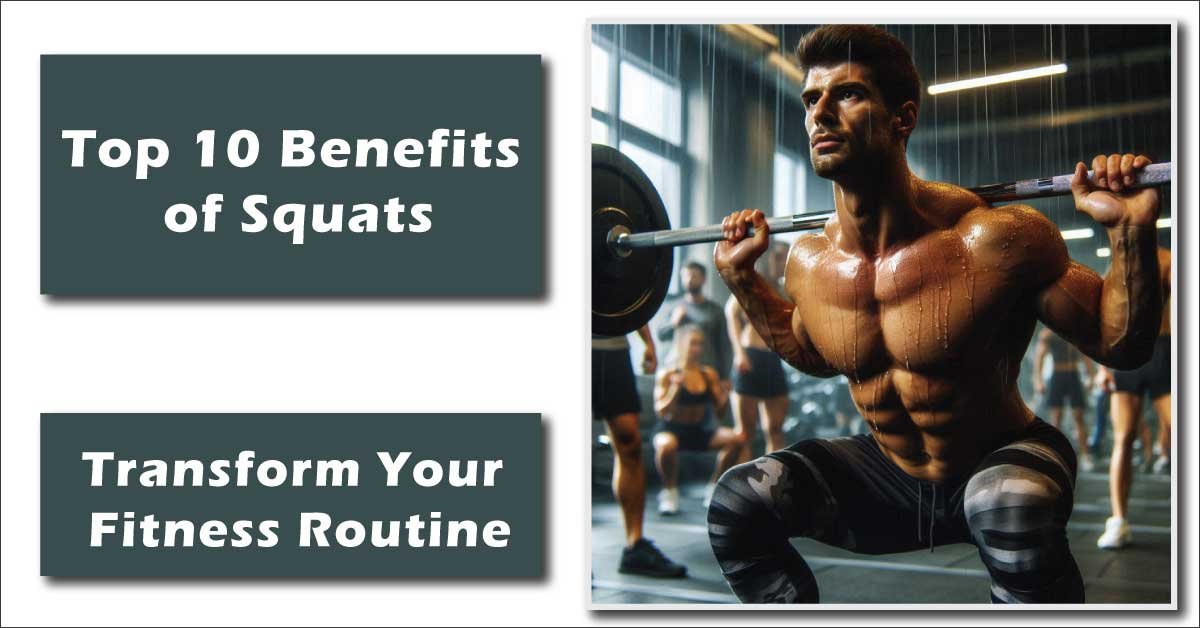Squats are often hailed as one of the most effective exercises you can include in your fitness routine. Whether you’re a beginner or an advanced athlete, squats offer unparalleled benefits that go beyond just building strength in your lower body. As a compound exercise, squats engage multiple muscle groups, making them a powerhouse move for improving strength, mobility, flexibility, and even mental well-being.
In this post, we’ll dive into the top 10 benefits of squats, explaining why this simple yet powerful exercise should be an essential part of your fitness regimen. If you’re looking to enhance your overall fitness, boost your athletic performance, or simply get stronger and healthier, squats are the answer.
Top 10 Squats Benefits
1- Enhanced Muscle Strength
Lower Body Strength
Squats are well-known for their ability to build lower body strength. When performed correctly, squats engage several large muscle groups in the lower body, including the quadriceps, hamstrings, and glutes. These muscles are crucial for performing everyday activities such as walking, climbing stairs, and even standing up from a seated position.
The act of lowering your body and then pushing back up against gravity mimics natural movements, making squats a functional exercise that directly strengthens the muscles you use in daily life. Over time, regular squatting helps improve endurance in these muscles and significantly increases strength.
Core Strength
Squats aren’t just a lower-body exercise, they also require the engagement of your core muscles. To maintain balance and stability, your abdominals, obliques, and lower back muscles must work hard to keep your torso upright and prevent your spine from rounding. This makes squats an excellent way to build core strength, which is essential for good posture, stability, and preventing back pain.
When you perform squats regularly, you activate the core muscles to a degree that other isolated abdominal exercises may not achieve, improving your overall core strength.
2- Improved Mobility and Flexibility
Joint Health
Squats are a full-body exercise that promotes joint health, particularly in the hips, knees, and ankles. When you squat, you’re required to move through a full range of motion, which helps to keep these joints healthy and mobile.
Squatting regularly encourages the production of synovial fluid, which lubricates the joints and prevents stiffness. This is especially important as we age, as maintaining joint flexibility can reduce the risk of arthritis and other degenerative joint diseases.
Increased Range of Motion
As you continue to practice squats, you’ll notice an improvement in your flexibility. The deep squat position requires you to push your hips back and lower your body, helping to stretch and lengthen the muscles in your legs, hips, and lower back. Regularly performing squats increases your range of motion and can improve your overall flexibility, making other exercises and physical activities easier and safer.
3- Better Posture and Balance
Posture Improvement
Good posture isn’t just about standing up straight—it involves using the right muscles to stabilize your body throughout daily activities. Squats help improve posture by engaging the upper back, trapezius, and shoulder stabilizers, all of which are essential for maintaining an upright, balanced position.
When squats are performed with proper form, they encourage a neutral spine, which is key for preventing slouching and lower back pain. As you strengthen your back and core muscles, you’ll notice a positive impact on your posture both during exercise and in everyday life.
Balance and Coordination
Squats are not only about building strength; they also challenge your balance and coordination. To execute a proper squat, your body must work in harmony, and your legs, core, and arms must all work together to maintain balance throughout the movement. This improves your body awareness and overall coordination, reducing the risk of falls and injuries in daily life.
Improved balance through squats translates to better agility, making it easier to perform physical tasks such as walking on uneven terrain or carrying heavy objects without losing stability.
Uncover the top 10 benefits of a 30-minute daily walk in our complete guide! From improving cardiovascular health to boosting mental well-being, learn how this simple habit can transform your life. Read more for a complete overview of its powerful health benefits!
4- Enhanced Athletic Performance
Power and Speed
Squats are widely used by athletes to improve their explosive power and speed. The movement of squatting involves both concentric and eccentric muscle actions that engage fast-twitch muscle fibers. This is crucial for generating power and increasing the speed of movement.
Athletes in sports like basketball, football, track, and soccer benefit from squats because of their ability to improve sprinting speed, jumping ability, and overall athletic performance. Squats develop the foundation of power, which is necessary for quick, explosive movements in competitive sports.
Functional Fitness
The strength gained from squats also contributes to functional fitness. Functional exercises improve your ability to perform everyday tasks such as lifting heavy groceries, carrying children, or sitting down and standing up with ease. Squats improve the body’s ability to bend and lift with proper form, making these activities safer and more efficient.
Squats train the muscles used for functional movements, making them a key exercise for anyone looking to stay active and independent as they age.
5- Calorie Burning and Weight Loss
High-Calorie Burn
As a compound exercise, squats engage multiple muscle groups, making them highly effective for calorie burning. The more muscles you recruit during an exercise, the more energy your body needs, which translates to greater calorie expenditure. Whether you’re doing bodyweight squats or adding weights, squats can be a great way to burn fat and support your weight loss goals.
When combined with a healthy diet, squats help to create a calorie deficit, which is essential for weight loss. Incorporating squats into your workout routine can lead to significant reductions in body fat over time.
Boosting Metabolism
Squats help boost your metabolism, both during and after your workout. By building muscle mass, squats increase your resting metabolic rate (RMR), meaning you’ll burn more calories even when you’re not exercising. This is crucial for long-term weight management and fat loss.
The combination of strength training and aerobic exercise in squats leads to an “afterburn” effect, where your body continues to burn calories for hours post-workout.
6- Hormone Production
Growth Hormone Release
Squats are one of the most effective exercises for stimulating the release of growth hormone. Growth hormone is a key player in muscle growth and repair, and regular squatting can significantly increase the levels of this hormone in your body.
The greater the muscle engagement and intensity of the squat, the higher the production of growth hormone. This makes squats an excellent exercise for anyone looking to build muscle mass or improve strength.
Testosterone Boost
In addition to growth hormone, squats also boost testosterone levels. Testosterone is crucial for muscle building, fat loss, and overall health, and regular squatting can help maintain optimal testosterone levels, especially in men. Testosterone also contributes to bone density, mood regulation, and heart health, making squats a great exercise for both men and women.
Discover how to unlock the fitness benefits in our comprehensive guide! Learn how exercise improves strength, endurance, and overall health. Explore proven strategies to maximize your fitness journey. Read more for a complete overview of the benefits and how to achieve them!
7- Injury Prevention
Strengthening Ligaments and Tendons
Squats help strengthen the ligaments and tendons surrounding your joints, which can reduce the risk of injuries. Stronger ligaments and tendons provide greater support and stability to your joints, preventing strains, sprains, and other common injuries.
By strengthening these connective tissues, squats also improve joint integrity, making it easier to recover from intense physical activity and avoid long-term injuries.
Improving Joint Stability
Squats enhance joint stability by improving the coordination and control of the muscles around your knees, hips, and ankles. This leads to better support for your joints, reducing the likelihood of injuries during other exercises or activities. Squats are particularly effective for those with a history of joint instability, as they improve muscle control and balance.
8- Enhanced Cardiovascular Health
Cardio Benefits
Squats are often seen as a strength exercise, but they also offer cardiovascular benefits. When performed at a high intensity, squats can elevate your heart rate, providing a cardiovascular workout that helps improve heart health. Squatting challenges both the cardiovascular and muscular systems simultaneously, making it an excellent full-body workout.
Endurance Building
Regular squatting increases stamina and endurance. The more you squat, the more your body adapts, leading to improvements in aerobic capacity. This allows you to perform physical tasks for longer periods without fatigue, making squats an excellent exercise for boosting endurance levels.
9- Mental Health Benefits
Stress Relief
Like any form of physical activity, squats are an effective way to reduce stress. Exercise stimulates the production of endorphins, which are natural mood boosters that can help alleviate anxiety and depression. The act of focusing on your form and the rhythm of your breathing while performing squats can also serve as a form of mindfulness, providing mental clarity and relaxation.
Boosting Confidence
Mastering squats can lead to a significant boost in confidence. As you increase your strength and improve your squat technique, you’ll feel a sense of accomplishment that positively impacts your self-esteem. This confidence extends beyond the gym, improving your overall outlook on life and other challenges.
10- Versatility and Accessibility
Variety of Squat Types
One of the best things about squats is their versatility. There are many different variations, such as bodyweight squats, goblet squats, front squats, and jump squats, all of which target the same muscle groups but with slightly different mechanics. Whether you’re a beginner or an advanced athlete, there’s a squat variation for you.
No Equipment Needed
Squats can be performed without any equipment, making them an excellent exercise for home workouts. Bodyweight squats require nothing more than your body and a small amount of space, making them accessible for anyone, regardless of their fitness level or the resources available to them.
Learn all about bench press: techniques, benefits, tips, and how-to in our complete guide! Discover the best form, maximize your gains, and get expert advice to improve your strength training. Read more for a complete overview on mastering the bench press!
Conclusion About Benefits of Squats
Squats are more than just a lower body exercise, they offer a wide range of benefits of squats that can improve your overall fitness, health, and quality of life. Whether you’re looking to build strength, lose weight, enhance your athletic performance, or improve your mental well-being, squats should be an essential part of your fitness routine.
Start incorporating squats into your workouts today, and experience the transformative benefits for yourself. Have you experienced the benefits of squats in your fitness journey? Share your experiences and tips in the comments below!

